Electrolyte drinks serve as a vital tool for hydration and replenishing essential minerals in the body across various age groups. Electrolytes such as sodium, potassium, calcium, and magnesium are crucial in maintaining the body’s fluid balance, nerve signaling, muscle function, and overall physical health. As the body loses these important ions through sweat during exercise, in the heat, or through illness, electrolyte drinks can help to restore the balance efficiently.
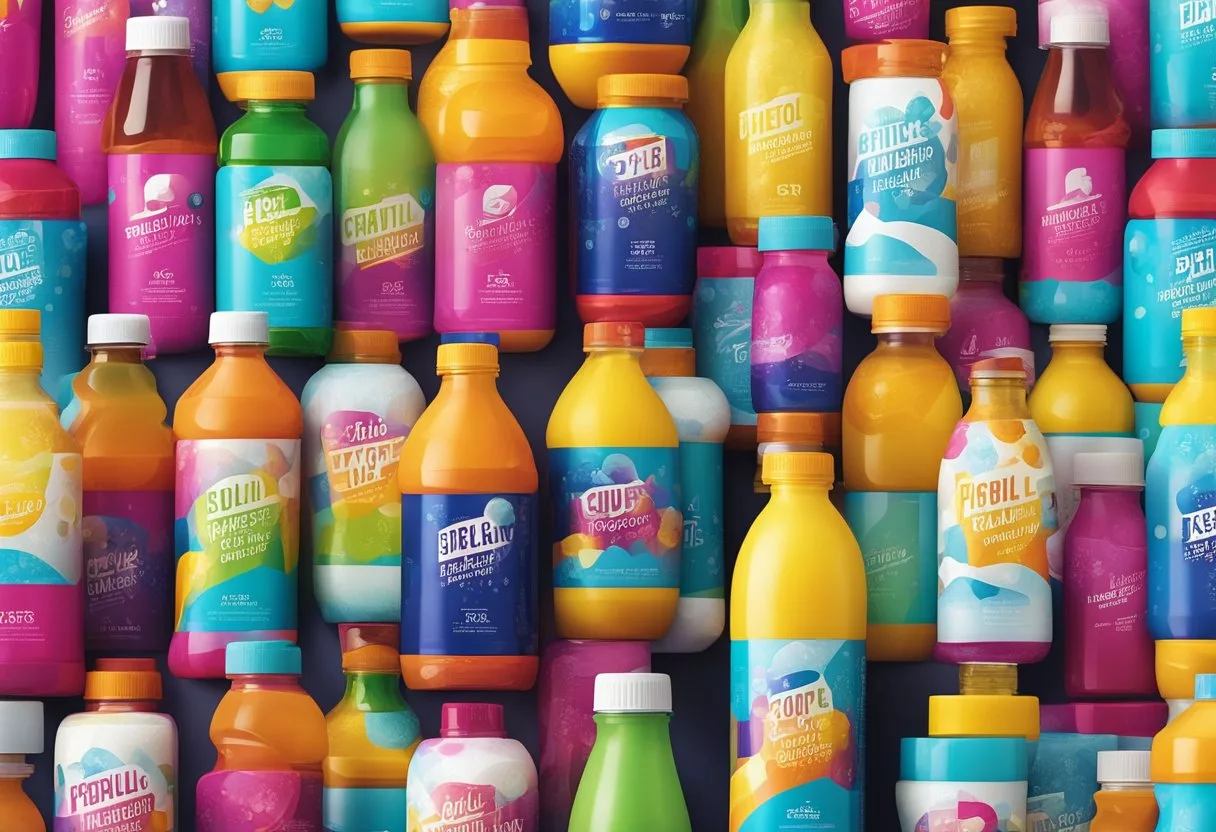
However, the specific electrolyte needs differ by age, activity level, and overall health.
For children, maintaining proper electrolyte balance supports growth and daily energy demands, while for adults, it can sustain endurance and prevent muscular fatigue during extended physical activity. For seniors, a focus on electrolyte intake is important to counterbalance the natural shifts in hydration status and kidney function that come with age.
Understanding the optimal composition of electrolyte drinks for each demographic is crucial for maximizing their benefits while ensuring safe consumption.
Key Takeaways
- Electrolyte drinks are essential for maintaining fluid balance and supporting muscle and nerve function.
- Age, activity level, and health determine the specific electrolyte needs of an individual.
- Choosing the right electrolyte drink composition is important for effective hydration and mineral replenishment.
Understanding Electrolytes
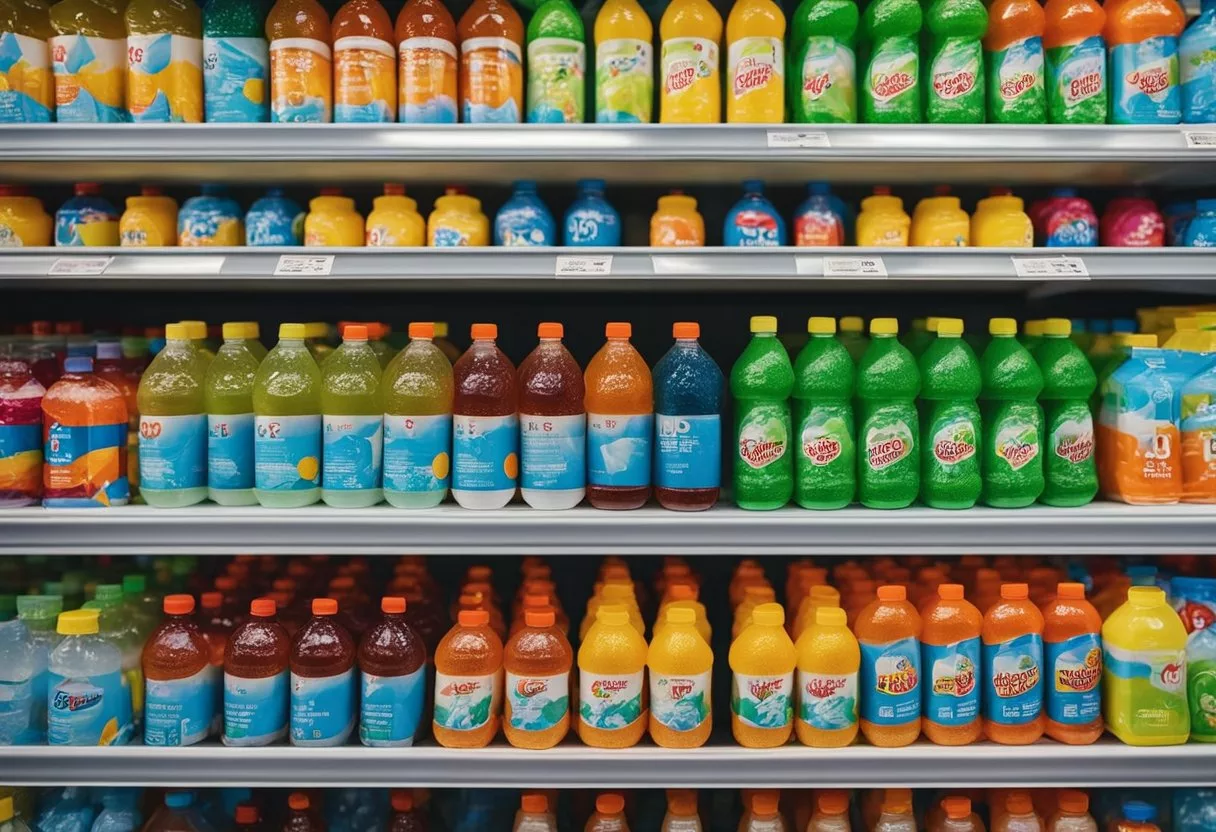
Electrolytes are vital minerals that are essential for many bodily functions, including maintaining fluid balance, nerve signaling, and muscle contractions.
Role of Electrolytes in the Body
Electrolytes such as sodium, potassium, magnesium, calcium, chloride, and phosphorus play crucial roles in the body. They are responsible for regulating hydration levels, muscle function, and acid-base balance in the blood.
Effects of Imbalance
An electrolyte imbalance can lead to various health issues. Too little sodium (hyponatremia) can cause dizziness and muscle cramps, while excess potassium may affect cardiovascular health. Dehydration can exacerbate these imbalances.
Sources of Electrolytes
Electrolytes are found in a variety of foods and beverages. For instance:
- Sodium: table salt
- Potassium: bananas, oranges
- Magnesium: nuts, leafy greens
- Calcium: milk, yogurt
- Chloride: tomatoes
- Phosphorus: fish, poultry
They are also present in fruit juices and coconut water which can provide a natural hydration boost.
Electrolytes and Daily Hydration
Maintaining fluid balance is crucial for daily hydration. Water is essential, but during periods of heavy sweating, such as exercise, electrolyte-rich fluids become important to rehydrate effectively.
Electrolyte Loss Through Sweat
Sweat contains sodium and chloride predominantly, with smaller amounts of potassium, magnesium, and calcium. During intense exercise or in hot climates, the body can lose significant amounts of these electrolytes.
Replenishing Electrolytes Post-Exercise
To replenish lost electrolytes and support recovery, including glycogen stores, individuals should consume electrolyte-rich drinks post-exercise. Sports drinks often add electrolytes and carbohydrates to aid in this recovery process.
Electrolyte Needs by Age Group

Electrolyte balance plays a crucial role in hydration and overall health across all age groups. Variations in lifestyle, physiological changes, and daily activities dictate the specific needs for electrolytes.
Infants and Young Children
Infants and young children have a greater need for hydration relative to their body size, especially when experiencing diarrhea or vomiting. Solutions like Pedialyte are designed to replenish fluids and electrolytes lost during illness. Proper electrolyte intake supports crucial growth and cognitive function during these formative years.
Adolescents
As adolescents engage in more physical activities and cope with stress, their bodies demand an increased supply of electrolytes. Sports drinks can be beneficial during exercise; however, they must be selected carefully to avoid excess sugars. Maintaining daily hydration is essential for this age group to support ongoing growth and mental alertness.
Adults
Adults require electrolytes to maintain fluid retention and combat the physiological stresses of work and exercise. An appropriate balance of electrolyte supplements can aid in hydration and help adults meet the demands of their daily activities. Regular intake of foods and beverages high in electrolytes is essential for maintaining hydration and energy levels.
Elderly
In the elderly, good hydration and electrolyte balance are critical. They are less able to conserve water and can be more susceptible to shifts in electrolytes. Careful management of electrolyte intake can help support cognitive function and fluid levels. Daily hydration with a focus on electrolyte-rich drinks is beneficial in this age group for maintaining general health.
Electrolyte Drinks Composition

Electrolyte drinks are crafted to improve hydration by replenishing vital minerals lost through sweat. They often contain a mix of electrolytes, sugars, and sometimes artificial components to enhance taste and performance.
Balancing Key Minerals
Electrolyte drinks provide a blend of key minerals essential for bodily functions: sodium, potassium, magnesium, calcium, and phosphate. Sodium and potassium are vital for nerve function and fluid balance, while magnesium supports muscle contractions, and calcium is crucial for bone health.
Sugar and Sweeteners in Electrolyte Drinks
Sweeteners, ranging from natural cane sugar to artificial sweeteners like sucralose, are included in some electrolyte drinks. While sugar can improve taste and provide energy, excessive added sugar is often discouraged. Alternatives like stevia and monk fruit offer sweetness without calories.
Artificial Flavors and Preservatives
Many brands add artificial flavors and preservatives to enhance taste and extend shelf life. However, these may not be suitable for everyone and can be avoided by choosing products labeled as free from artificial ingredients.
Natural vs Synthetic Components
Electrolyte drinks vary in their use of natural ingredients versus synthetic additives. While some users prefer drinks with natural flavors and no artificial preservatives, others may not mind synthetic components. It’s important to read labels carefully to understand what is in the product.
Specialty Electrolyte Drinks
There is an array of specialty electrolyte products catering to specific needs, such as electrolyte waters for low-calorie hydration, and electrolyte powders for customizable dosing or enhanced convenience. Sports drinks are specially formulated to support athletic performance with a thoughtful balance of electrolytes and energy-providing ingredients.
Electrolyte Drinks in Market
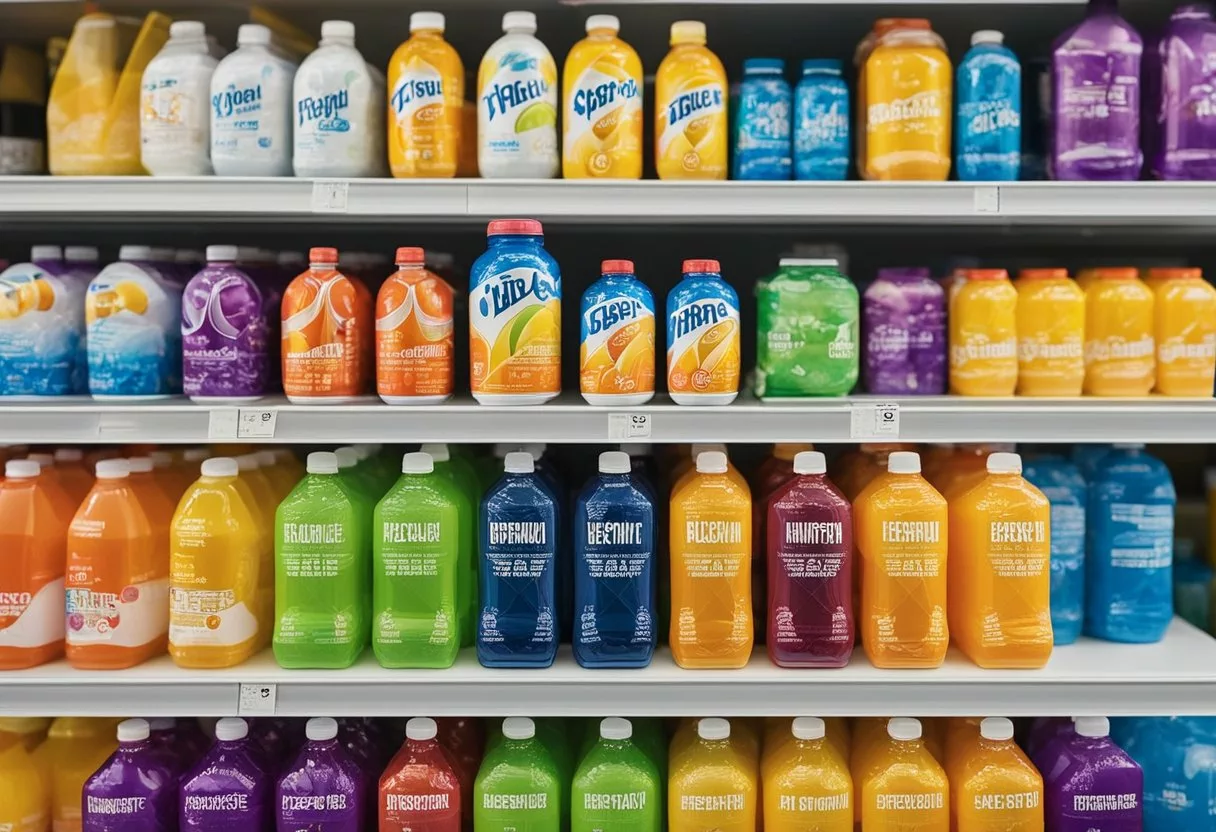
The electrolyte drink market is diverse, with products ranging from sports drinks to coconut water. This section explores the types, dominant brands, and consumer choices impacting the market.
Overview of Electrolyte Drink Types
Electrolyte drinks serve as a means of hydration, particularly after physical activities or during illness. Markets are stocked with various forms, including sports drinks, electrolyte powders, tablets, and drops. Sports drinks like Gatorade traditionally cater to athletes, while options like Pedialyte are geared towards children to aid in hydration and electrolyte replenishment.
Leading Brands and Products
Renowned brands like Nuun and Kaged Hydra Charge offer a spectrum of electrolyte products. These include convenient effervescent tablets that dissolve in water and powders that mix to create a replenishing drink. Gainful personalizes electrolyte powders to suit individual dietary needs. Each brand touts a unique blend of electrolytes aimed at optimizing hydration.
Assessing Quality and Value
Consumers assess the quality of ingredients, looking for products that are often third-party tested for assurance. Value is measured not only in cost but also in the benefits received, like the proper balance of electrolytes without excessive sugars or artificial ingredients.
Consumer Trends and Preferences
Taste is a significant factor in consumer preference. Flavors like strawberry lemonade, watermelon, and pink lemonade lead the way. These indulgent flavors mask the typically salty taste of electrolytes, making them more palatable. Flavorings and taste innovations continue to play a crucial role in the purchasing decision alongside the product’s efficacy in hydration.
Safe Consumption Guidelines
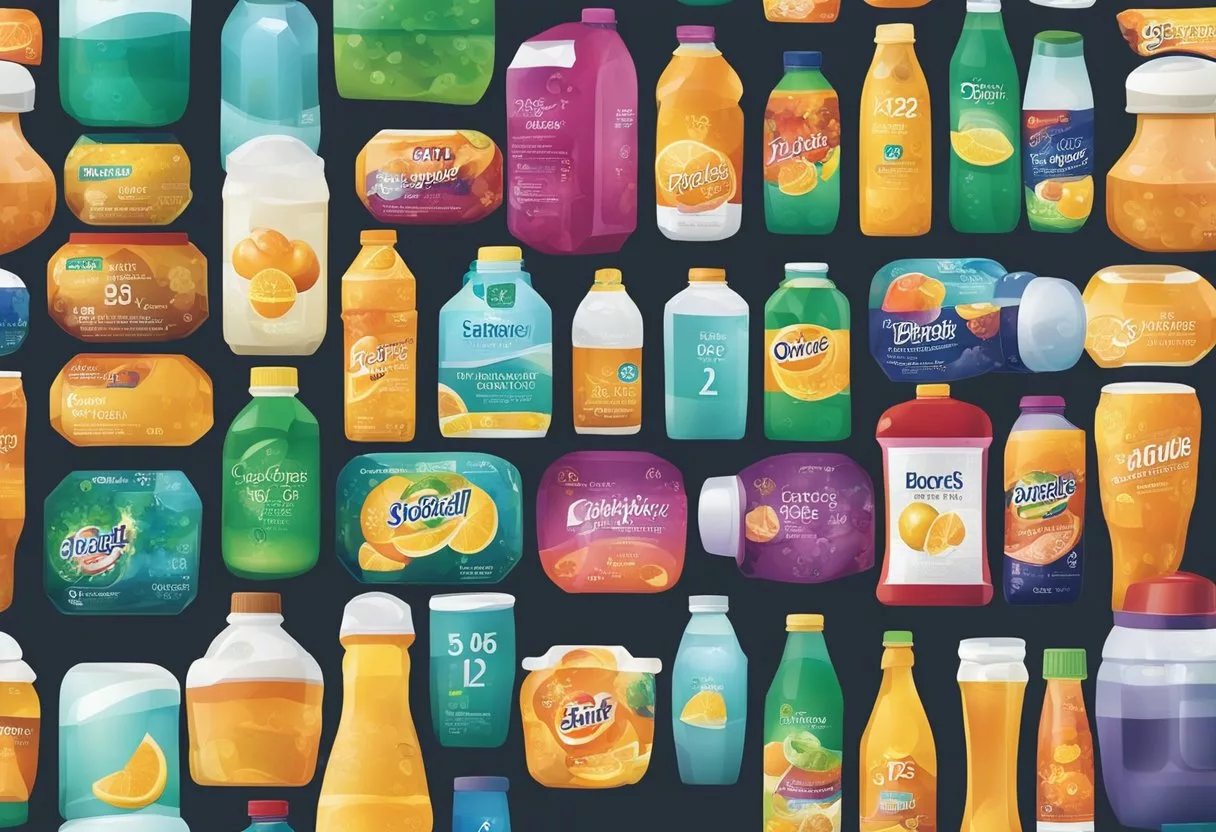
When considering the use of electrolyte drinks, it’s vital for individuals to understand the balance between maintaining hydration and avoiding the risks of overconsumption. These guidelines focus on the appropriate intake for various age groups, the importance of moderation, and the necessity of consulting healthcare professionals for tailored advice.
Recommended Daily Intake
The American College of Sports Medicine advises that maintaining proper hydration is crucial during exercise. For most adults engaging in regular physical activity, consuming electrolyte drinks to replace lost fluids and minerals like sodium can be beneficial. It is generally recommended to drink 16-20 ounces of fluid for each pound of body weight lost during exercise. Children and older adults have distinct hydration needs and should consume electrolyte beverages with lower levels of sugar and sodium.
Avoiding Excessive Use
Safety concerns arise when there is overconsumption of electrolyte drinks, leading to an imbalance of electrolytes. Excessive sodium intake can be particularly harmful, potentially causing high blood pressure and cardiovascular issues. Users should carefully consider the labels on electrolyte drinks to avoid high sugar content, which can counteract the benefits of rehydration. For safe consumption, individuals should not exceed sporting organizations’ recommended amounts unless advised by a healthcare provider.
Consulting Healthcare Professionals
To ensure the safest use of electrolyte drinks, one should seek medical advice, particularly from registered dietitians. They can provide tailored recommendations based on an individual’s unique health profile and activity level. This is especially important for people with existing health conditions or those on medication that can affect hydration and electrolyte balance. Consulting a healthcare professional can prevent the risks associated with dehydration and overconsumption, aligning electrolyte intake with personal health goals.
Diet and Lifestyle Considerations
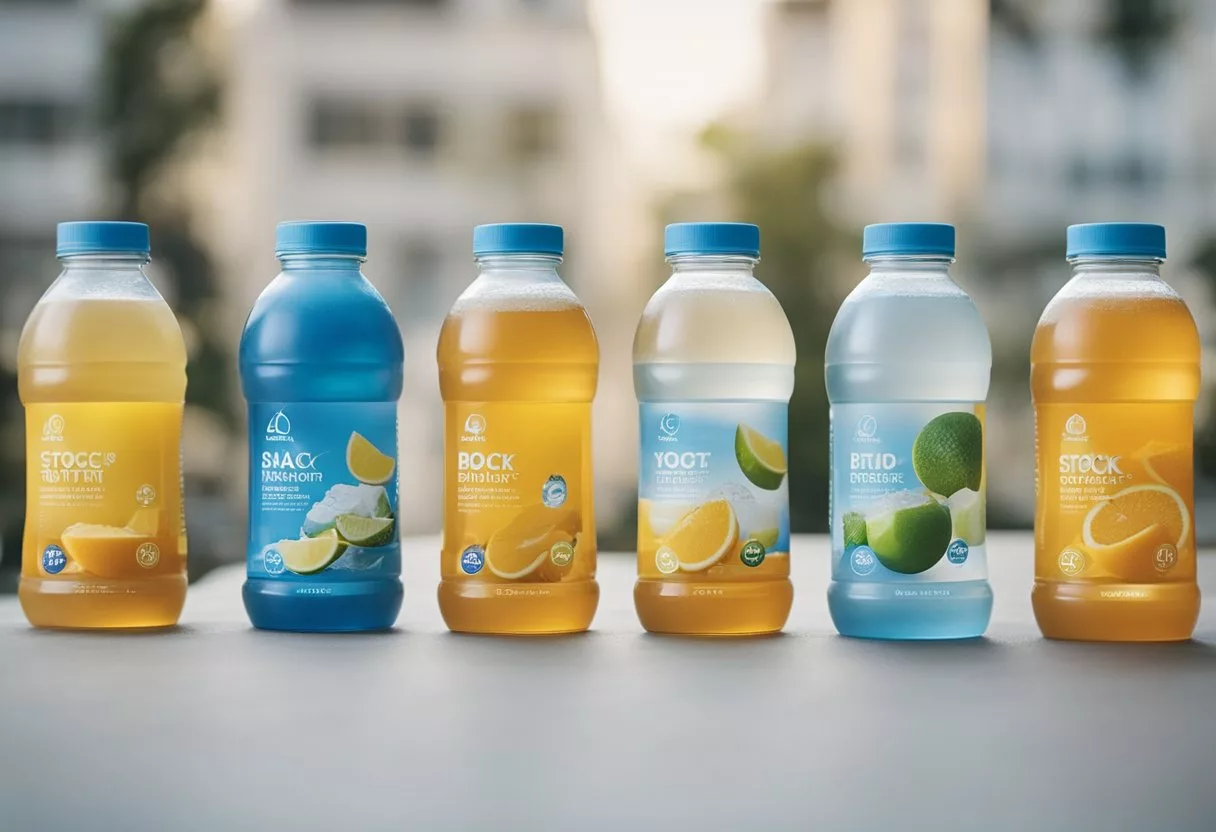
When considering the integration of electrolyte drinks into one’s diet, hydration, dietary balance, and the relationship between fluid intake and exercise are pivotal elements to address.
Hydration Through Food
They can obtain significant hydration from fruits and vegetables in their diet. Items such as cucumbers, watermelons, and oranges are not only rich in water but also provide essential electrolytes like potassium and magnesium. For instance, incorporating a glass of fruit juice can be an enjoyable way to stay hydrated and support electrolyte levels.
Balancing Electrolytes with Regular Diet
A balanced diet should naturally contain a spectrum of essential minerals. Regular consumption of vegetables, lean proteins, and whole grains contributes to a steady supply of electrolytes such as sodium, calcium, and phosphorus. Those looking to manage their electrolyte intake can include foods like bananas and sweet potatoes that are high in potassium, or almonds and spinach for magnesium.
Exercise and Fluid Intake
Fluid intake should be tailored to one’s lifestyle, especially for those engaged in strenuous exercise or for competitive athletes. Maintaining adequate hydration and electrolyte levels is crucial for sustaining energy, as exercise increases the need for these minerals. Consuming carbohydrates in combination with electrolytes can aid in glycogen replenishment. Additionally, water intake should be adjusted to match exercise intensity and duration to prevent dehydration.
Frequently Asked Questions

When choosing an electrolyte drink, it’s important to consider age-specific needs and health implications.
What characteristics make an electrolyte drink suitable for elderly individuals?
Electrolyte drinks for seniors should have lower sugar content, moderate electrolytes to avoid overloading their kidneys, and a taste profile that encourages regular sipping to maintain hydration.
Which electrolyte drinks are specifically recommended for children’s hydration?
Drinks designed for children should be free from artificial colorings and sweeteners, with a balanced electrolyte content to support their active lifestyles and rapid growth.
How can one replenish electrolytes without consuming sugary drinks?
Electrolyte replacement can be achieved by opting for drinks that use natural sweeteners or are sugar-free. Some brands provide electrolyte tablets or drops that can be added to water, circumventing the need for additional sugars.
Are there particular electrolyte drinks that are optimal for adults experiencing dehydration?
Electrolyte drinks with a higher sodium and potassium content can be beneficial for adults dealing with dehydration, to more rapidly restore levels that are commonly depleted.
Is it safe for adults to consume electrolyte-infused water on a daily basis?
For most healthy adults, consuming electrolyte-infused water daily is safe, but should be balanced with regular water to prevent an electrolyte imbalance.
What are the best options for electrolyte replenishment when suffering from an illness?
When ill, one should look for electrolyte drinks with a blend of sodium, potassium, and glucose. These help in rehydration and energy supply, particularly if experiencing vomiting or diarrhea.